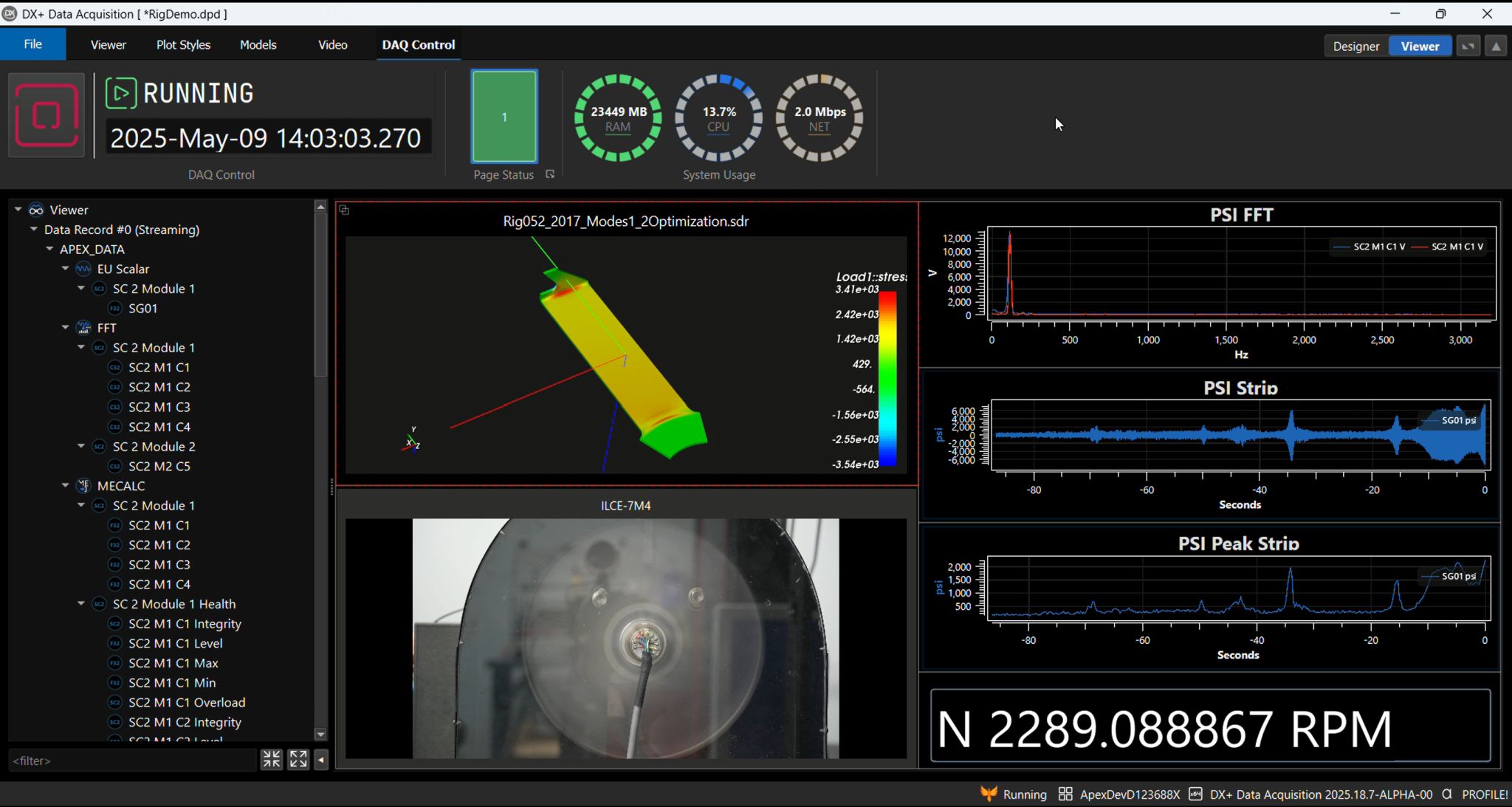In 2023, APEX provided a comprehensive 196-channel Data Acquisition and Monitoring System (DAMS) to support the instrumentation of a new twin test cell being constructed for gas turbine research in Bangalore, India. The twin test cell was designed to carry out performance, endurance, and certification tests on developmental aero gas turbine engines ranging from 40 to 130 kN thrust class with afterburning. APEX designed, procured, and set up the system, which included 164 MeCalc QuantusSeries multifunction channels, 16 Hood Tip-Timing channels, and 16 GadCap Capiscence Tip Clearance channels. This case study highlights the complexity of the installation, and the effectiveness of the solutions provided. The project involved the integration of various systems to handle large volumes of data generated during gas turbine testing, ensuring precise measurement and analysis.
The system requirements for the DAMS system necessitated the integration of measurement systems from multiple hardware vendors to meet the comprehensive needs of the project. The gas turbine engines being tested were to be heavily instrumented and thoroughly tested to evaluate their performance. The system needed to manage large amounts of data generated during these tests, allowing for data acquisition, monitoring, analysis, and storage for future use.
A network-based, iDDS compliant system was required for this installation. Due to the size and complexity of the test site, the system delivered had to be efficient, visual, intuitive, highly automated and reliably scalable. It needed to integrate various signals and be synchronized using Precision Time Protocol (PTP) to ensure accurate and high-resolution data acquisition.
As a developmental engine test cell (R&D experimental facility), the DAMS was required to support configurable features for pre-processing during tests and post-processing. The configuration of DAMS was to include a distributed architecture with Low Bandwidth and High Bandwidth Data Acquisition Modules along with monitoring stations.
The system was also required to support and integrate measurements for various parameters, including vibration, dynamic pressures, rotational speed, strain gauge, tip clearance, and tip timing. The DAMS was to be positioned in the control room of the twin test cell and cater to both test cells to acquire and monitor various critical parameters online during engine tests and store data obtained from the engine under test.
APEX provided a modular and synchronized data acquisition system that met all the specified requirements. The solution was divided into seven separate systems, each grouped by functionality to manage overall data rates effectively. The system synchronization utilized Precision Time Protocol (PTP), simplifying reconfiguration and allowing for high-resolution data acquisition.
An important aspect of this solution was implementing the direct connect interface from the APEX software to the MeCalc systems. This development enabled integration and communication between the APEX software and MeCalc devices, ensuring efficiency and reliability without compromising performance or data productivity, which is often a challenge when integrating high volumes of dynamic data through open protocols.
The MeCalc systems were selected for their highly modular architecture, which delivers unparalleled customization and scalability. This modularity enables independent addition or upgrading of components, adapting to evolving testing requirements and technologies. The MeCalc multi-function cards support a wide range of sensors, including ICP®, voltage, piezoelectric charge, tachometer, temperature, and strain, making them versatile for diverse measurement needs. All signals are recorded synchronously, ensuring precise and consistent data acquisition regardless of sampling speeds and update rates.
Engineered for durability and portability, the MeCalc system is constructed from high-quality aluminum with conduction cooling, performing reliably in temperatures ranging from -20°C to 62°C. Its compact design maximizes channel footprint and density, suitable for both field and rack-mount applications. Additionally, with built-in Li-Ion batteries and an uninterrupted power supply, the system operates continuously without external power.
48 Channel Vibration System
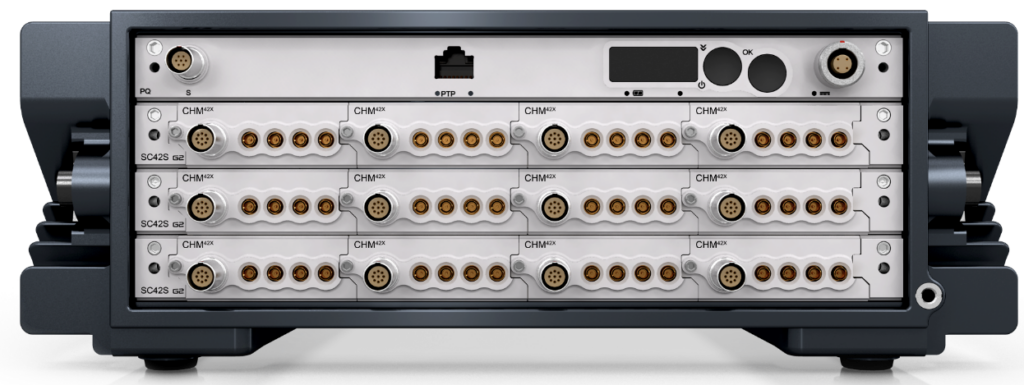
- Components: DQ04 Mainframe, CHM42X modules.
- Features: Software-selectable input types, analog buffer output, high sample rate.
- Customer Requirements: Support for charge, ICP, and voltage inputs, buffered voltage output, high sample rate.
- Advantages: The DQ04 Mainframe offers a robust and reliable platform for vibration measurement, with a high data rate capacity of 66 MB/s and PTP IEEE 1588 v2 synchronization. The CHM42X modules provide software-selectable input types, allowing for flexibility in measurement configurations. The high sample rate of 204.9 kSa/s ensures accurate and detailed data acquisition.
32 Channel Dynamic Pressure System
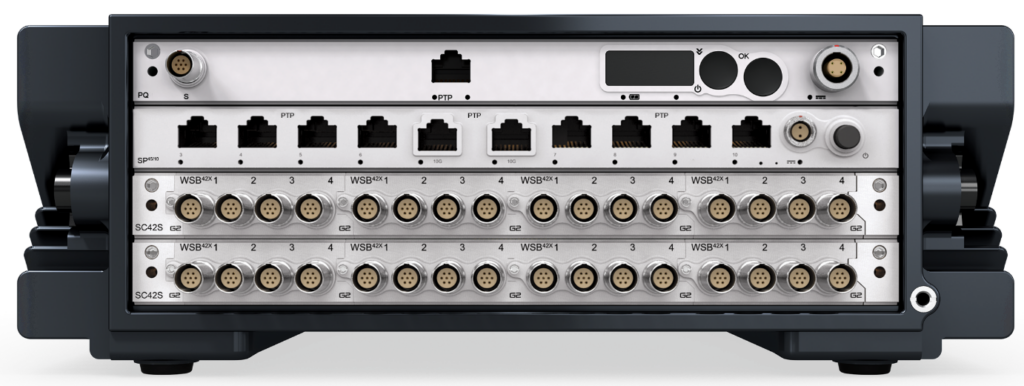
- Components: DQ04 Mainframe, WSB42X modules, SP 20 Ethernet Switch.
- Features: Software-selectable input types, excitation for kulite pressure sensors, high sample rate.
- Customer Requirements: Support for multiple input types, high sample rate.
- Advantages: The WSB42X modules offer software-selectable input types, including ICP, voltage, and strain, providing versatility in measurement applications. The integrated excitation for kulite pressure sensors eliminates the need for external excitation hardware, simplifying the setup. The SP 20 Ethernet Switch allows for seamless system synchronization without additional hardware.
28 Channel Microphone and Eddy Probe System
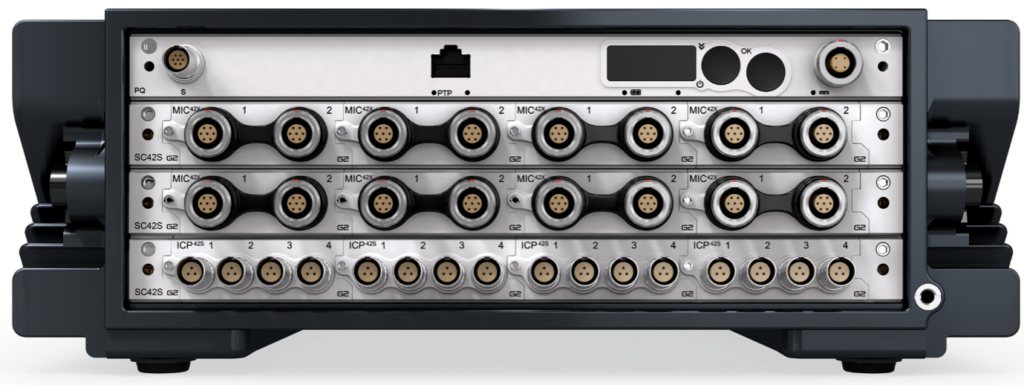
- Components: DQ04 Mainframe, MIC42X and ICP42S modules.
- Features: Software-selectable input types, high sample rate, wide voltage range.
- Customer Requirements: Support for microphone and eddy current probe signal conditioning, high sample rate.
- Advantages: The MIC42X modules provide advanced microphone signal conditioning with 200 V polarization and a high sample rate of 204.9 kSa/s. The ICP42S modules offer a wide voltage range of ±60V, making them suitable for various sensor types. The system’s flexibility and high sample rate ensure accurate and reliable data acquisition.
48 Channel Strain Gauge System
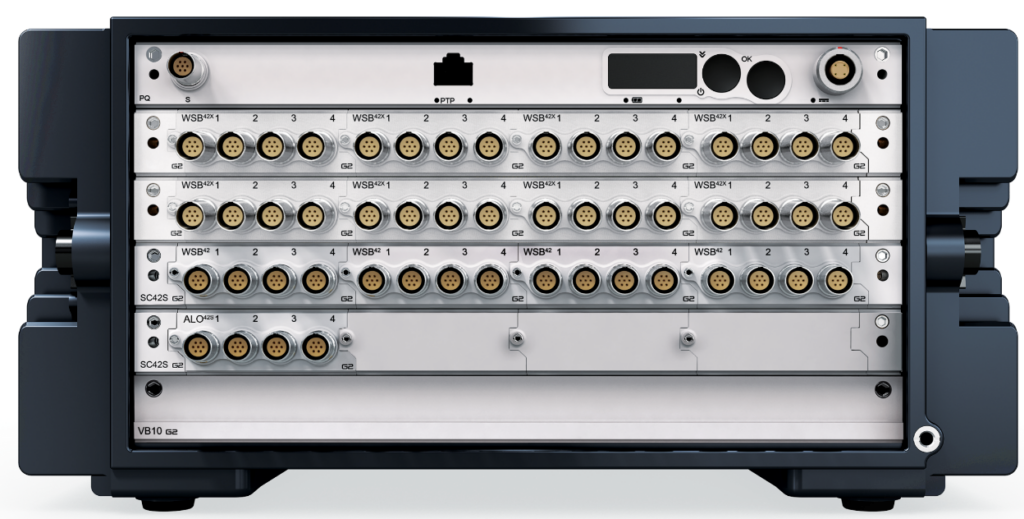
- Components: DQ06 Mainframe, WSB42X modules.
- Features: Software-selectable input types, constant voltage and current excitation, high sample rate.
- Customer Requirements: Support for multiple strain gauge types, high sample rate.
- Advantages: The WSB42X modules provide support for various strain gauge configurations, including full, half, and quarter bridges. The constant voltage and current excitation options ensure accurate and stable measurements. The high sample rate of 204.9 kSa/s allows for detailed data acquisition, making the system ideal for strain measurement applications.
NI 8-Channel D/A System
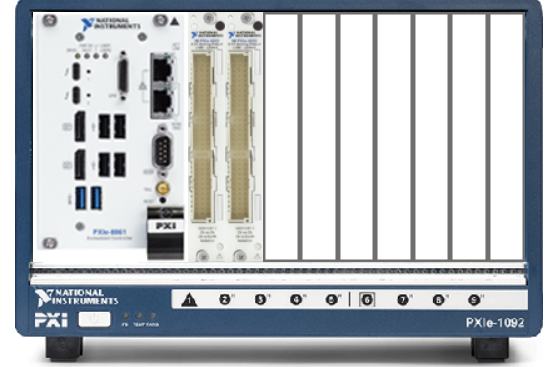
- Components: NI PXIe-8861, NI PXIe-4322, NI PXIe-1092.
- Features: Digital-to-analog output, high-speed playback and validation tests.
- Customer Requirements: High-speed recorder, analog signal creation.
- Advantages: The NI PXIe-8861 controller provides a powerful and compact embedded computer solution for PXI Express systems, ideal for processor-intensive applications. The NI PXIe-4322 module offers accurate and simultaneous dynamic voltage and current outputs, making it suitable for automotive applications. The high-speed playback and validation tests ensure reliable and accurate data acquisition.
16 Channel Hood Tip-Timing Solution
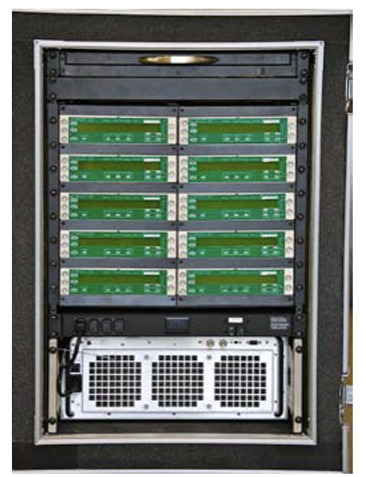
- Components: BVM20036, Hood Tech Optical Sensors, Hood Tech Eddy Current Probes.
- Features: High-speed data acquisition, integrated oscilloscope, high-temperature sensors.
- Customer Requirements: Monitoring engine or turbine rotor dynamics, high-temperature operation.
- Advantages: The BVM20036 system provides a comprehensive solution for monitoring engine or turbine rotor dynamics, with high-speed data acquisition and integrated oscilloscope capabilities. The Hood Tech Optical Sensors and Eddy Current Probes offer high-temperature operation, making them suitable for demanding environments. The system’s rugged construction ensures reliable performance in harsh conditions.
16 Channel GadCap Blade Tip-Clearance System
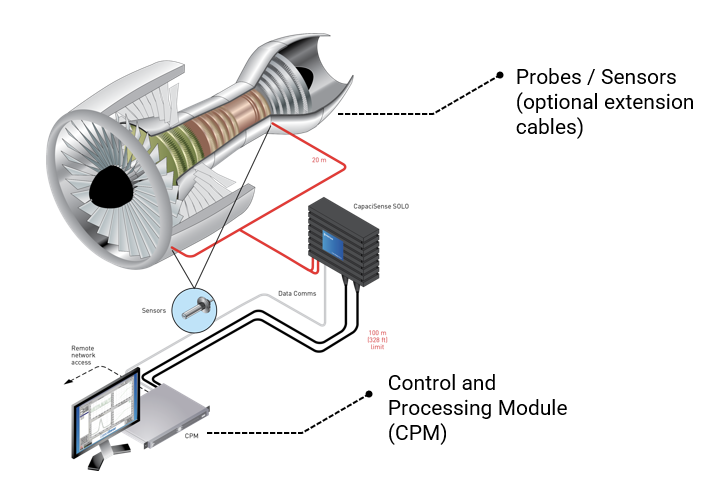
- Components: CapaciSense SOLO+CPM units, GadCap Capacitive Probes.
- Features: High-speed data acquisition, remote management, rugged construction.
- Customer Requirements: Measuring blade tip-clearance, high-temperature operation.
- Advantages: The CapaciSense SOLO+CPM units provide a high-speed data acquisition solution with remote management capabilities. The GadCap Capacitive Probes offer rugged construction and high-temperature operation, making them suitable for turbine applications. The system’s flexibility and reliability ensure accurate and stable measurements.
The APEX data acquisition system delivered to instrument the gas turbine test cell represented a sophisticated installation that required precise synchronization, a modular design, and the flexibility to handle various input types and high data rates. The integration of MeCalc systems was critical in meeting these requirements and offering a robust and efficient solution. The MeCalc systems provided several advantages, including system synchronization via Precision Time Protocol (PTP), a modular approach that enhanced equipment utilization rates, and exceptional signal conditioning quality.
APEX partnered with Hood Technologies and GadCap to provide the customer with tip-timing and tip-clearance systems based on their requirements. The Hood Tip-Timing system included high-speed data acquisition, integrated oscilloscope capabilities, and high-temperature sensors, making it suitable for monitoring engine or turbine rotor dynamics in demanding environments. The GadCap Blade Tip-Clearance system featured high-speed data acquisition, remote management capabilities, and rugged construction, ensuring accurate and stable measurements in high-temperature turbine applications. These partnerships enabled APEX to deliver solutions tailored to the specific requirements of gas turbine testing, ensuring precise data acquisition and analysis.
This case study underscores APEX’s capability to deliver high-quality, customized solutions for complex testing environments. By selecting APEX, clients can be assured of receiving innovative and reliable solutions tailored to their specific needs, ensuring accurate and comprehensive data acquisition and analysis for gas turbine testing.

